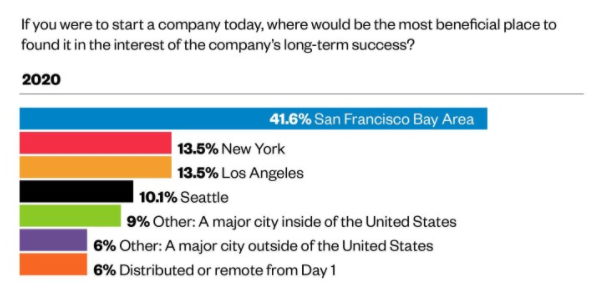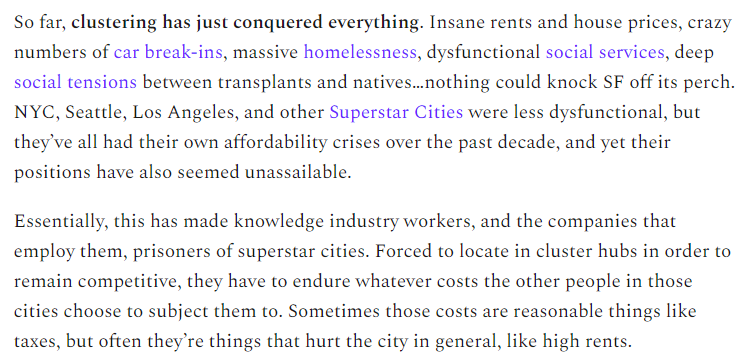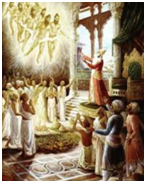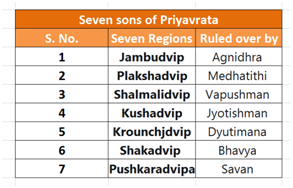Skeptics of universities say: "But most of the people who graduate end up leaving."
1/OK, I should really write another thread about university-centric regional development, because I think people often make some (very understandable) mistakes when thinking about this issue.
Skeptics of universities say: "But most of the people who graduate end up leaving."
Educating local kids is good for the nation, but doesn't help a region much.
The way a university helps a region is through RESEARCH.
https://t.co/zud8wNQDTh
But university RESEARCH pulls in OTHER smart people from other regions, and they stay there.
Here's a paper showing that this is the main way universities increase a region's human capital: https://t.co/ofu256tsFi
Companies want to partner with university labs, so they can commercialize the technologies the labs produce. So they invest in the labs, and sometimes they even put their offices in the town.
https://t.co/NiVzQVgn5I
Answer: A little bit. But mainly because this means less tuition money that can be used to fund university research labs.
BUT, the most important thing is to fund research more!!
Critics of university-centric development like to point out that the probability of succeeding at this is very low.
But this doesn't really matter.
My hometown of College Station is no Silicon Valley. But College Station, and its surrounding region, are thriving thanks to a university.
https://t.co/2GduLv9SL5
Beyond the research-and-investment thing I discussed earlier, universities also draw in residents from small towns, creating pleasant small cities.
https://t.co/2xqpKdMZUs
https://t.co/hYSbEKxeV8
In fact, this is unlikely to be a useful approach. https://t.co/uxUcLHzmON
What we have to do is UPGRADE the RESEARCH CAPABILITIES of the second- and third-tier universities.
1. By spending more research dollars there
2. By encouraging companies to partner with the labs there
3. By letting these universities admit more high-paying foreign students
4. A new land grant program?
More from Noah Smith
When Republicans started to believe in racial bloc voting - when they stopped believing that nonwhite people could ever be persuaded to vote Republican - they started to see immigration as an invasion.
This explains why immigration is now at the center of partisan conflict.
Of course, the belief in ethnic bloc voting becomes a self-fulfilling prophecy.
When a slight Dem tilt among Hispanics and Asians caused the GOP to turn against them, Hispanics and Asians shifted more toward the Dems. Etc. etc. A self-reinforcing cycle.
Bush's 2006 amnesty attempt, and the 2013 intra-GOP fight over immigration reform, were two moments when the GOP could have turned back to the approach of Reagan, and courted Hispanics and Asians.
But they decided against this, and...here we are.
What will disrupt this bad equilibrium, and save American politics from being an eternal race war?
Either:
A) More white voters will grow disgusted with the GOP approach and defect, or
B) The GOP will find some non-immigration-related issues to attract more Hispanics and Asians.
As long as both parties see elections in terms of racial bloc voting - where the only way to win is to increase turnout among your own racial blocs or suppress turnout by the other party's racial blocs - American politics will not improve, and the country will decline.
(end)
This explains why immigration is now at the center of partisan conflict.
Why did California turn Blue?
— Sen. Eric Brakey (@SenatorBrakey) October 28, 2018
Why is Texas turning Blue?
The left has failed at selling socialism to the American people for decades. We have rejected it.
Their new strategy is mass importation of new voters to transform our political culture.
Of course, the belief in ethnic bloc voting becomes a self-fulfilling prophecy.
When a slight Dem tilt among Hispanics and Asians caused the GOP to turn against them, Hispanics and Asians shifted more toward the Dems. Etc. etc. A self-reinforcing cycle.
Bush's 2006 amnesty attempt, and the 2013 intra-GOP fight over immigration reform, were two moments when the GOP could have turned back to the approach of Reagan, and courted Hispanics and Asians.
But they decided against this, and...here we are.
What will disrupt this bad equilibrium, and save American politics from being an eternal race war?
Either:
A) More white voters will grow disgusted with the GOP approach and defect, or
B) The GOP will find some non-immigration-related issues to attract more Hispanics and Asians.
As long as both parties see elections in terms of racial bloc voting - where the only way to win is to increase turnout among your own racial blocs or suppress turnout by the other party's racial blocs - American politics will not improve, and the country will decline.
(end)
Time for panel #3: Big Tech and regulation!
I will be live-tweeting again, and you can also watch video at either the Twitter or Facebook links below!
Kaissar: Every industry gets regulated when it gets big. The question is what kind of regulation Big Tech will get,and whether the companies will be proactive in shaping it.
Kaissar: More profitable companies have higher returns. Why? Maybe it's a risk factor, because more profit = higher risk of getting regulated.
Bershidskyis showing a diagram of GDPR complaince pop-ups. What a massive ill-conceived bureaucratic mess.
Ritholtz: It's 2018 and we're still talking about Facebook privacy settings?! If you're still giving your personal data to Facebook, you just don't care about privacy!
I will be live-tweeting again, and you can also watch video at either the Twitter or Facebook links below!
Bloomberg Ideas conference now starting! I will be live-tweeting it. You can watch on our Facebook or Twitter pages (links below)! https://t.co/Mbr9dZzWBy
— Noah Smith (@Noahpinion) October 25, 2018
Kaissar: Every industry gets regulated when it gets big. The question is what kind of regulation Big Tech will get,and whether the companies will be proactive in shaping it.
Kaissar: More profitable companies have higher returns. Why? Maybe it's a risk factor, because more profit = higher risk of getting regulated.
Bershidskyis showing a diagram of GDPR complaince pop-ups. What a massive ill-conceived bureaucratic mess.
Ritholtz: It's 2018 and we're still talking about Facebook privacy settings?! If you're still giving your personal data to Facebook, you just don't care about privacy!
Bloomberg Ideas conference now starting! I will be live-tweeting it. You can watch on our Facebook or Twitter pages (links below)!
Our first panel is about cryptocurrency! We have @matt_levine, @tylercowen, @eiaine, @nirkaissar, and Camilla
Ou: Crypto will be useful for the unbanked.
Cowen: Crypto has to compete against a bunch of other emerging payments technologies. Bitcoin is too inflexible.
Cowen: I'll bet on the payments companies over crypto.
Today and tomorrow we'll be having a Bloomberg Ideas event!
— Noah Smith (@Noahpinion) October 25, 2018
Today will be a panel on cryptocurrency.
Tomorrow will be panels on the economics of AI, and on regulation of big tech companies.
You can watch livestreams here:https://t.co/1dC0ELGvabhttps://t.co/Juz5Mp2EC1 pic.twitter.com/VfxOscNflo
Our first panel is about cryptocurrency! We have @matt_levine, @tylercowen, @eiaine, @nirkaissar, and Camilla
Ou: Crypto will be useful for the unbanked.
Cowen: Crypto has to compete against a bunch of other emerging payments technologies. Bitcoin is too inflexible.
Cowen: I'll bet on the payments companies over crypto.
1/Lots of tech companies and workers are making noises about leaving San Francisco, LA, NYC, and other "superstar" cities.
Some are predicting a shift to remote work and distributed companies.
Let's take a hard look at what that would actually
2/We're all familiar with the trend of tech companies and other knowledge industries (finance, biotech, etc.) piling into a few tech hubs, raising rents and house prices.
Now some think the advent of Zoom, Slack, etc. might reverse this trend.
https://t.co/nQVCJrKvrB

3/But escaping the superstar cities is going to be tough.
The forces keeping tech companies in places like SF are so strong that these regions have essentially become prisons for these companies.

4/In order to escape the prison of the superstar cities, tech companies and other knowledge industries will have to overcome the Four Jailers of Industrial Clustering:
1. In-person office productivity
2. Thick market effects
3. Knowledge spillovers
4. City life amenities
5/I'm actually pretty optimistic that companies can find ways to make remote work productive.
Studies show that working from home *some* of the time actually tends to raise
Some are predicting a shift to remote work and distributed companies.
Let's take a hard look at what that would actually
2/We're all familiar with the trend of tech companies and other knowledge industries (finance, biotech, etc.) piling into a few tech hubs, raising rents and house prices.
Now some think the advent of Zoom, Slack, etc. might reverse this trend.
https://t.co/nQVCJrKvrB

3/But escaping the superstar cities is going to be tough.
The forces keeping tech companies in places like SF are so strong that these regions have essentially become prisons for these companies.

4/In order to escape the prison of the superstar cities, tech companies and other knowledge industries will have to overcome the Four Jailers of Industrial Clustering:
1. In-person office productivity
2. Thick market effects
3. Knowledge spillovers
4. City life amenities
5/I'm actually pretty optimistic that companies can find ways to make remote work productive.
Studies show that working from home *some* of the time actually tends to raise
More from Society
So, as the #MegaMillions jackpot reaches a record $1.6B and #Powerball reaches $620M, here's my advice about how to spend the money in a way that will truly set you, your children and their kids up for life.
Ready?
Create a private foundation and give it all away. 1/
Let's stipulate first that lottery winners often have a hard time. Being publicly identified makes you a target for "friends" and "family" who want your money, as well as for non-family grifters and con men. 2/
The stress can be damaging, even deadly, and Uncle Sam takes his huge cut. Plus, having a big pool of disposable income can be irresistible to people not accustomed to managing wealth. https://t.co/fiHsuJyZwz 3/
Meanwhile, the private foundation is as close as we come to Downton Abbey and the landed aristocracy in this country. It's a largely untaxed pot of money that grows significantly over time, and those who control them tend to entrench their own privileges and those of their kin. 4
Here's how it works for a big lotto winner:
1. Win the prize.
2. Announce that you are donating it to the YOUR NAME HERE Family Foundation.
3. Receive massive plaudits in the press. You will be a folk hero for this decision.
4. Appoint only trusted friends/family to board. 5/
Ready?
Create a private foundation and give it all away. 1/
Let's stipulate first that lottery winners often have a hard time. Being publicly identified makes you a target for "friends" and "family" who want your money, as well as for non-family grifters and con men. 2/
The stress can be damaging, even deadly, and Uncle Sam takes his huge cut. Plus, having a big pool of disposable income can be irresistible to people not accustomed to managing wealth. https://t.co/fiHsuJyZwz 3/
Meanwhile, the private foundation is as close as we come to Downton Abbey and the landed aristocracy in this country. It's a largely untaxed pot of money that grows significantly over time, and those who control them tend to entrench their own privileges and those of their kin. 4
Here's how it works for a big lotto winner:
1. Win the prize.
2. Announce that you are donating it to the YOUR NAME HERE Family Foundation.
3. Receive massive plaudits in the press. You will be a folk hero for this decision.
4. Appoint only trusted friends/family to board. 5/


















